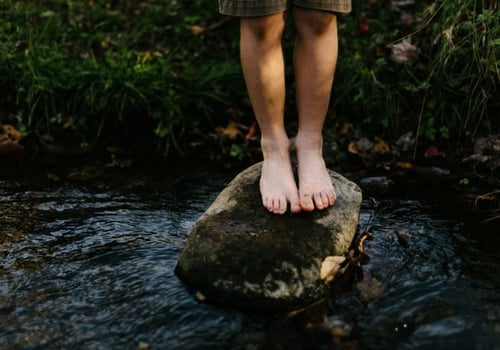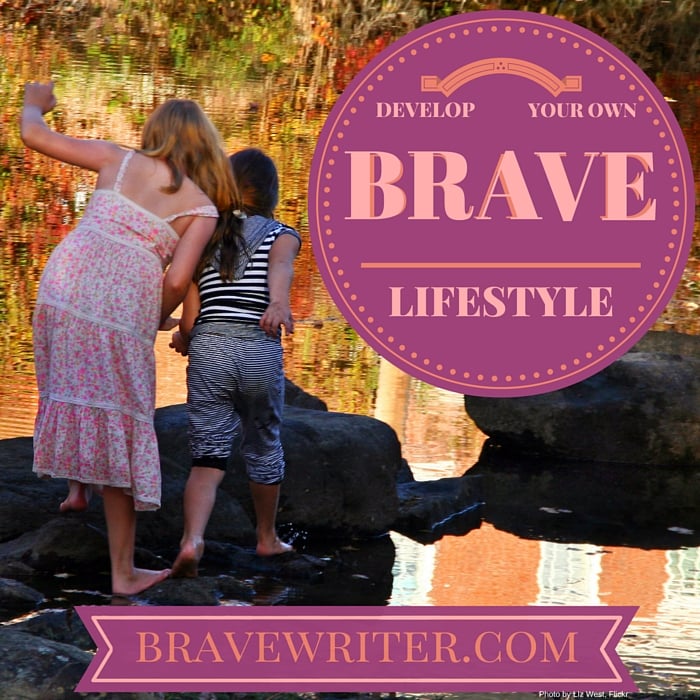Planning Your Own Brave Writer Lifestyle
Every summer I get a few emails essentially asking the same thing…
How do you plan your school year? Do you require your kids to accomplish and certain amount of work daily or weekly?
I’ve been at this home education thing for seventeen years. I don’t like to set up a schedule that focuses on specific subjects. What I try to do is to make sure that the things we say we want to do, get done. So if a child wants to go to the zoo, I make sure it’s on the calendar somewhere or we’ll never go. If someone wants to be sure not to miss a Discovery channel program or a movie, we get the DVR set to record it. If a child expresses an interest in cake decorating, we find a class. I see my primary role as that of facilitator. I make things happen for my kids (the things they can’t do because they don’t drive, don’t have money or don’t have the awareness of the opportunities).
Do I schedule copywork or dictation? Are my kids required to work through a math text? Do we follow a history program? Are we setting academic goals?
My simple answer. No.
Now for my more complicated answer.
Live your joy in the presence of your children.
The Brave Writer Lifestyle is a snapshot of the way we live. Copywork and dictation are done by those kids that enjoy them or see benefit in them. Those who don’t like them, don’t do them. Simple as that. I see these tools the way someone might look at a drawing program. You can learn to draw using a course and following the steps that the instructor suggests so that you draw a face with accuracy, for instance. But that isn’t the only way to learn to draw a face. It’s just that those exercises, measurements and techniques are effective, so why not use them? Artists have cultivated habits that help non-artists learn to draw.
Same with learning to play the piano. You can try to learn on your own (my son has done this), but it’s often easier if you have a book and an instructor who gives you exercises (my daughter is doing this).
I see writing the same way. There are methods and techniques, habits and practices that encourage and foster writing skills. Kids (and parents!) who want to write well will do them because they want to write well.
Kids who haven’t yet discovered the power of writing or the desire to write or the value of written communication may not get the point of copying a poem or quote the way E.M. Forster did every day. If a child slogs through the practice that is meant to enliven his writing, will it still work? It may (or may not) but he won’t be a happier, more enthusiastic writer at the end of it. Likely, he’ll be grumpy and become a resistant writer.
The first step, then, has to be that writing comes to life for the child! (And I’ve devoted a lot of space to that concept so I won’t do that again here.)
When I looked, really looked, at history, math, science and so on, I applied a similar principle. What tools get the job done for kids who’ve discovered that these are subjects they’d like to know more about?
I bring into the home that which the kids wouldn’t think to study or enjoy on their own (Sister Wendy Art videos, rock examination kits complete with cool magnifying glasses, books about the Civil Rights Movement, strategy games, math puzzles, Shakespeare films and plays, painting supplies, binoculars and bird feeders…). I offer these with genuine enthusiasm because even if not a single kid in the family cares about them, I do!

I live my joy in the presence of my children.
And then we talk… we talk lots.
I share what I know that they don’t – for instance, how to get into college, what kinds of skills will help them succeed as adults, how we can tackle the subject they don’t like so well but that seems important to their futures (and I wait for the child to “catch” the vision… I don’t impose) and so on. My 11 year old discovered recently that handwriting mattered to him… for the first time in his life. He is now handwriting each day on his own to improve. I supply tools: notebook, pencil, poetry book, stand to hold book open, clean table, and so on.
My daughter wants to read fluently so we read together every other day. She sets the pace and we spend the time it takes. I check out books from the library that she can read.
I have two teens (16 and 13) who are preparing for college. They follow math programs because that works best for them. My daughter (16) said to me once that when I stopped requiring math, she suddenly realized she needed it. She woke up one day and realized that if she didn’t keep up with her program, she would limit her options for her future. So she stopped trying to “get out of it” each day and started working hard. She took off an entire year from doing math in 9th grade and is now in 11th and is almost done with Algebra II on her own with a tutor. She made up for her “lost time” with motivation.
My oldest (18) has not finished enough science to get into college. Last night, he shared with me that he wishes he’d gone ahead and completed the science last year, but that he didn’t have the vision yet. Did he blame me? No. I had laid out for him a possible plan that would work, but he didn’t choose my plan. So he is now evaluating the choices still open to him. In the meantime, we have a great relationship because it hasn’t been about my pushing him to see what he didn’t see himself.
And he’s taking a college course anyway, of his own choosing, on his own path.
So when I plan the school year, I do think about where they are and where their skills could go. I imagine writing we can do together (similar to what I shared in the June and July issues of the Arrow and Slingshot) and pencil those ideas in. The ideas I shared in those issues come from my own experience of sorting out how I can work with my kids intentionally, but without coercion. Then I offer and suggest and create as inviting an environment as I can and see what clicks. I help kids who want help and I back off of kids who are engaged elsewhere.
Then I trust. I trust the process and I stay involved. Those two principles under gird everything we do.
So do I plan?
Yes. I spend time planning games, outings, outside lessons for playing piano or painting, tutorials for math or science that they want but I can’t teach, writing ideas that will stimulate them, movies to watch, field trips to take, nature hikes to go on, and all the fun snacks we can bake for our poetry tea times. Those take a lot of planning.
Julie
P.S. This philosophy of home education has taken years to evolve. Don’t worry if you are living a different reality currently. This is how we do it. It fits us. I offer it as a window of insight into our home. You will develop a lifestyle that is your own.


















